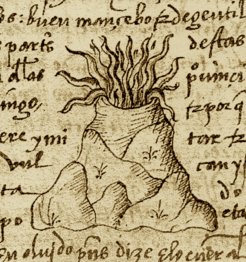Gonzalo Fernández de Oviedo
Research Project

He was the idol of Alexander von Humboldt, who adored him as the "Pliny of the New World": Gonzalo Fernández de Oviedo (1478-1557). Chronicler of the discovery of America, world traveller, explorer, courtier, novelist, translator, artist, entrepreneur, notary. The long, colourful life of this key figure of the modern age is a unique panopticon of the radical changes that took place in the first half of the 16th century.
Oviedo wrote like a madman, penning, among other things, a novel of chivalry (of the kind so cherished by Don Quixote) and translating Boccaccio into Spanish. The most mature fruit of this eventful life, however, was the monumental "Historia general y natural de las Indias", one of the most important natural histories in world literature, which is not yet available in German translation.
Throughout his life, the chronicler, who was well acquainted with the ars notaria, dealt with the relationship between reality and fiction, and truth and lies. If in the 2020s, in the supposedly "post-factual age" with its "alternative truths", shifts in information and communication technology were causing upheavals and calling Enlightenment ideals of discourse into question, in the 1520s epidemic distrust and disorientation were caused by circumstances that touch the core of Oviedo's oeuvre and conception of life: on the one hand, the unprecedented loss of authority with which the Grail guardians of the hitherto largely unchallenged ancient and Christian canons of knowledge were faced (they could not, by any stretch of the imagination, reconcile the existence of the American continent with their "truths"); on the other hand, the overwhelming diversity of contradictory news from the New World, which made the European public, with its instruments of truth-finding inadequate over such great distances, aware of its own helplessness.
The project deals with Oviedo's life and work as well as his programmatic struggle for truth and reality. The aim is also to open up new ways and forms of communicating (legal) historical and theoretical content. Therefore, the focus is not on the monograph and the conventional research article, but - as in other sub-projects of the research field "Transmedia HistoryTelling" - on narrative and graphic-pictorial approaches. In this way, Oviedo's own ambitions and interests can be mirrored and revived, for the Spaniard regularly experimented with text-image arrangements and the most diverse literary genres.
